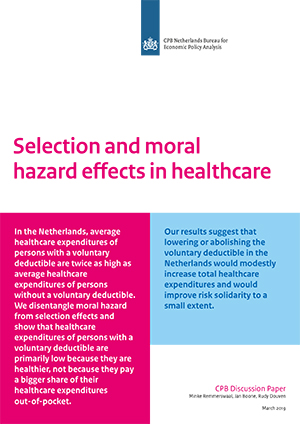Selection and moral hazard effects in healthcare
Our study shows that selection, not moral hazard, is the main effect explaining the difference in healthcare expenditures between persons with and without a voluntary deductible. Furthermore, we find that 18 year olds who never chose a voluntary deductible reduce their healthcare spending by 26 euros (on average) in response to a 100 euro increase in the (mandatory) deductible. However, for 18 year olds who chose a voluntary deductible (on top of the mandatory) we find that this choice does not result in a further reduction in healthcare spending.
Downloads
For the full population, we use a panel regression and find that for people who chose a voluntary deductible (on top of the mandatory) that a 100 euro increase in the deductible leads to an average reduction in healthcare spending of 25 euros per person. For the population as a whole these results suggest that lowering or abolishing the voluntary deductible in the Netherlands would modestly increase total healthcare expenditures and would improve risk solidarity to a small extent.
Authors

